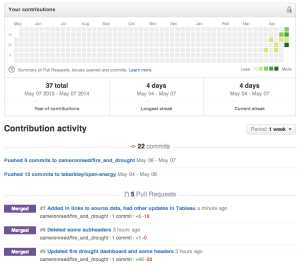One thing that Mike Berger brought up in the last assignment when we were studying mobile applications that encourage behavior modification was the idea of streaks. I remember with CodeAcademy (which has plenty of problems, but does a few things right) how it encouraged me to not break my streak. I’m just learning git and how to use Github, I noticed that it has the same feature, and incorporates a simple but clear visualization of your work. While Github isn’t directed towards behavior modification and this may incentivize certain users to push too many small commits, it’s also a compelling way to track yourself and keep at a project.
Category Archives: Mobile Technology Implementation
Collaboration Without Feedback- Changing Online Possibilities
Something I’ve been fascinated with this semester is the Twitch Plays Pokemon phenomenon.

Twitch Plays Pokemon (http://www.twitch.tv/twitchplayspokemon) started out as the original Pokemon Red game, a single player game from the 90s built for the GameBoy. An emulator of the game was hosted on the Twitch website, and accepted commands (A, B, Start, left, right etc) from a text entry box that any users could connect to. As such, it was a single player game run by thousands and thousands of concurrent players; somehow, despite thousands of “trolls” and an inability to directly plan gameplay, the users won the game after 16 days.
I’ve studied the game as part of my work for Social and Organizational Issues of Information, and it is pretty remarkable. It shows what can be achieved without any mechanisms for feedback- for instance, users don’t know whether there command got chosen or not for any “move” (e.g. if the character moved left, was it because they typed “left” or because of someone else). And the likelihood of any single user having an impact on the actual gameplay is minimal. Yet hundreds of thousands of people played.
We’ve talked a lot about these issues in a variety of ways, from gamification to peer pressure to the build/fight/unite framework for getting teams to achieve their utmost. But I think we can learn two things from Twitch Plays Pokemon.
First, that online forums for communication and collaboration are still new, and we haven’t yet reached the limits of their designs. While enterprise knowledge exchange systems, wikis and peer annotation seem like they have been around forever, in fact they are just some of the first developments for online collaboration. People will continue to develop more and more creative ways for online socializing and online collaboration, and these tools may ultimately be more effective for changing behaviors or achieving extraordinary results than anything we have currently designed. We should continue to push the envelope with what is possible.
Secondly, Twitch Plays Pokemon lays out some of the assumptions we bring to the table when we think about collaborative achievement as part of a team or social group. The system affords no feedback to users, no leaderboard, no positive reinforcement. It is bare bones. However, users still flocked to it. The likely cause is threefold- first, that it was an unique system, second that the game chosen had a particularly enthusiastic fan base, and third that it gained significant media attention. Whatever the reasons, it shows that when evaluating how to achieve extraordinary results (I consider a hundred thousand people defeating a single player game without speaking to each other directly extraordinary) we should be willing to consider the absurd.
Infinity in our Pockets.
For those of you who thought the “Focus” exercises for the course app, check out these pointers from Medium. I was looking for distraction tips during finals week so I could spend less time on my phone and computer and more time on doing my work and spending time with my family as a result. The idea is simple: remove everything from your phone that is unnecessary; anything with a stream, anything that is a search engine, and take out the email. I thought the most resonating point he made was: “I can’t have infinity in my pocket”.
I am pretty frightened to do this, but for finals week I might give it a go. Just typing that makes me nervous. Anyone have any suggestions for infinity-addicts?
ARTICLE HERE: https://medium.com/life-hacks/80f8d525b0d8
Assignment 4 Team Placement
Team #1
Agrawal, Siddharth
Friedman, Sydney
Phan, Evie
Young, Paul
Team #2
Arvizu, Pablo
Greis, David
Pérez, Ignacio
Tsai, Dan
Team #3
Berger, Michael
Gutman, Max
Malhotra, Ramit
Swigert, Peter
Team #4
Chen, Jung-Wei Jennifer
Hess, Jonas
MacFarland, Ian
Sparks, Evan
Team #5
Fan, Christopher
Hitchcock, Meredith
Lo, Jenny
Siddiqui, Sufia
Team #6
Jakobsen, Ronnie
Linding Jørgensen, Elin
Li, Johnny
Puthyapurayil, Seema
Mini-Assignment
We are crowdsourcing next mission. You are required to suggest one short and practical task — an activity that anyone in the class can carry out — that is based on the course concepts, as well as vote on your favorite mission idea submitted by other students. Please see more details at https://tricider.com/en/brainstorming/1X4QO. Deadline is Tuesday, April 22 at 6 PM.
If you have any questions regarding either of these, feel free to contact Professor Hansen or myself.
Forming Habits: The idea of “exercising”
It seems that there was some confusion in the last minutes of class today regarding the exercise of finding techniques for becoming better at focusing and simplifying in daily work. Sorry to have not been clearer. Here’s the idea in a nutshell. We can all learn to focus and simplify better. We can learn about that in the classroom and go out and do it ourselves. Our we can have a mobile “coach”–a system that drops tips on us, small techniques to implement in a day. They not only help us do better that day, but they also help us form a habit. For example; let’s say that on this coming Monday you received a notification on your phone, “Today, say NO to something you want to do that takes at least one hour of your time, then use that time instead to work on a key priority.” So you say “No!”, and then you get stuff done that hour, feel good, and now you have taken a first step in learning to say NO. Then maybe you will just continue doing so, forming a habit of learning to say No in order to focus. These are “micro-habits” that together and cumulatively leads to more effective behaviors.
As an analogy, a few months ago I signed on to weightwather.com to learn how they cajole their customers to lose weight. They try to get people to engage in small habit changes, routines they call them. I chose to do “put down your cutlery on the table between bites” (the theory being that when you slow down eating, you eat less). Similarly, when you don’t bring your smartphone to meetings, you probably listen better , if that’s what you’re working on.